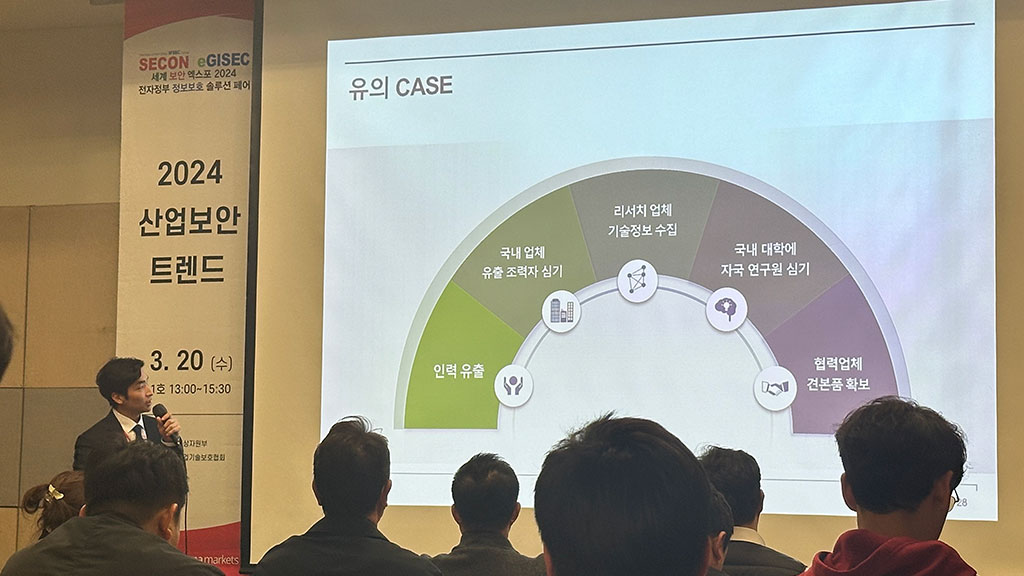최근 산업기술 해외유출 사례가 증가해 국가적 손실이 유발되는 가운데, 기업은 기술이 보호받기 위해 국가핵심기술 인정 여부를 확인할 필요성이 대두된다. 정부는 산업기술보호법 개정을 통해 기술 유출 처벌 강화 및 기술 보호 강화 정책을 추진하고 있다.
2023년 기술유출 22건...2018~2022년 피해액 약 26조
국가핵심기술, 영업비밀과 별개로 법적 보호 대상 포함
산업부, 산업기술보호법 개정안…기술 유출 처벌 강화
최근 산업기술 해외유출 사례가 증가해 국가적 손실이 유발되는 가운데, 기업은 기술이 보호받기 위해 국가핵심기술 인정 여부를 확인할 필요성이 대두된다. 정부는 산업기술보호법 개정을 통해 기술 유출 처벌 강화 및 기술 보호 강화 정책을 추진하고 있다.
20일 킨텍스에서 개최된 세계 보안 엑스포에서 산업통상자원부와 한국산업기술보호협회(Kait)가 산학연 산업보안 관계자 및 일반 참가자 대상으로 ‘2024 산업보안 트렌드 보안교육’을 진행했다.
산업기술 유출 관련 사례와 대응방안을 주제로 발표한 법무법인 율촌 이한결 변호사가 제시한 경찰청 자료에 따르면, 2023년 해외 기술 유출 사건 송치 건수는 22건으로 2022년 대비 10건이 늘었다. 주요 피해기술은 디스플레이, 반도체 및 기계, 조선·로봇 등이다. 이중 디스플레이 관련 기술 유출이 9건에 달했다. 산업통상부에 따르면 기술유출 피해액은 2018년에서 2022년까지 약 26조원으로 추산(국정원)된다.
주요 기술 유출 사례로는 인수합병(M&A)을 통한 사례, 퇴사 직원에 의한 사례, 협력업체를 통한 사례 등이 있다. 구체적 조사된 자료는 없지만 국가별 유출 현황은 중국의 비중이 늘고 있는 추세다.
예컨대 2022년 삼성전자 자회사인 세메스가 개발한 반도체 세정장비 핵심 기술을 빼내 장비를 만든 뒤 710억원 규모를 중국으로 넘긴 형제는 징역 10년, 업체는 15억원 배상이라는 판결을 받았다. 이는 초임계 세정장비의 세팅값 및 인터락 정보가 국가핵심기술로 지정됐다는 점과 영업 비밀 누설이라는 근거에서 기술 유출 사건으로 입증된 사례다. 직원들에 대해 1심에서보다 형이 늘어났으며, 반도체 장비제조 업체에도 원심이 판결한 벌금 10억원을 파기하고 벌금 15억원이 선고됐다.
또한 3D 라이네이션 기술을 공동 개발했던 두 협력기업의 사례에서, 디스플레이 제조 대기업 A사에게 제조 설비를 납품하던 B사는 매출 증가세가 더뎌지자 중국 업체에 장비를 팔기 위해 위장업체를 설립해 중국 업체에 납품을 한 바 있다.
해당 사실이 들통난 후 A사는 B사가 3D 라미네이션 기술에 대해 영업 비밀 누설과 국가핵심기술 및 첨단 기술을 유출했다고 주장했다. B사는 1심에서 무죄 판결을 받았으나, 2심에서 비밀 유지 계약서를 기반으로 한 회사에서 매뉴얼 등 정보를 다른 기업에 공유할 권리는 없다는 판결을 받아 B사의 대표는 영업 비밀 침해로 징역 3년형을 선고받았다.
이 변호사는 “해외 기술 유출 사건을 다룰 경우, 영업비밀과 산업기술의 차이를 이해하는 것이 중요하다”고 강조했다. 영업 비밀은 요건만 갖춰지면 성립이 되며, 기술적 정보나 경영상 정보도 해당될 수 있다. 그러나 산업기술은 법에서 지정돼 고시가 된 기술을 뜻한다. 산업기술의 유출방지 및 보호에 관한 법률에는 산업기술은 영업비밀 형태로 존재하지만 특허와 같은 공개된 지식재산권으로도 존재하며, 승인, 신고 미이행 처벌과 관련해 의미가 있다고 표기하고 있다.
국가핵심기술은 산업기술에 포함된다. 산업기술보호법에 표기돼 있는 부분으로, 영업비밀이 보호가 되는 것과 별개로 국가핵심기술은 필수적으로 보호되고 있다. 국가산업기술의 경우, 정부의 지원을 받은 기술은 승인이 필요하며, 지원을 받지 않았을 경우 신고 요건을 갖추게 된다.
이 변호사는 “해외 기술 유출 사건에서 영업 비밀 혹은 산업기술 또는 국가핵심기술인지를 판단하는 것이 중요하다”며, “특성은 병렬적으로 중복 적용이 가능하나, 산업기술인 경우, 영업비밀로 관리되는 요건이 없더라도 특정 고시에서 지정한 기술로 충족이 되면 산업기술로서 보호될 수 있다”고 설명했다.
이 변호사는 최근 기술 유출이 문제가 되는 분야로 배터리 분야를 꼽았다. 유럽을 중심으로 국내 배터리 인력을 뺏으려는 움직임이 많이 보이고 있으며, 중국에서 국내 업체에 유출 조력자를 심거나, 대학교에 연구원을 심는 경우도 발생하고 있다는 설명이다. 또한 리서치 업체 등 컨설팅 회사를 통해 핵심 제품이나 조립 공정 등의 정보를 받거나, 협력업체에 대해 대기업 샘플을 요구 및 유통시키는 사례도 유의할 필요가 있다.
한편 정부는 산업기술보호법 개정안을 통해 기술 유출 처벌을 강력히 처리하고, 관리 및 심사 강화를 추진하고 있다. 지난해 11월에는 ‘범부처 기술유출 합동대응단’이 출범했다. 산업통상부는 지난해 12월 산업통상부는 제47회 산업기술보호위원회에서 “산업기술의 보호를 위해서는 무엇보다 유출자에 대한 엄정한 처벌이 중요하다”며, “조속히 산업기술보호법이 개정되고, 양형기준도 현실화될 필요가 있다”고 말했다.
이를 위해 산업통상부는 예방적 차원에서 처벌 범위를 강화하기 위한 방안을 내놨다. 우선 처벌구성요건을 목적범에서 고의범으로 확대했다. 해외 기술 유출 범죄에 대한 벌금은 현재 15억원 이하에서 국가핵심기술은 최대 65억원 이하로, 이외에 산업기술은 최대 30억원으로 상향됐다. 기술유출 브로커도 처벌할 수 있도록 침해행위를 확대하고, 침해에 대한 징벌적 손해배상한도를 3배에서 5배로 확대하기도 했다.
또한 기업이 개별적으로 신청하지 않아도 정부가 판단해 특정 기술이 국가핵심기술에 해당하는지 판정 절차를 개시할 수 있는 '판정신청통지제'를 신설한다. 이는 사전에 고의적으로 기술 유출을 막기 위함뿐만 아니라 과실에 의한 불법 수출을 예방하기 위한 조치다.
산업통상부의 2024년 산업기술보호 정책방향에 따르면, 상반기 ‘무역기술안보전략’이 발표된다. 하반기에는 중장기 국가핵심기술 보호 제도 개선을 위한 ‘제5차 산업기술보호 종합계획’을 발표할 예정이다.
